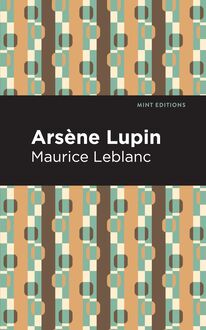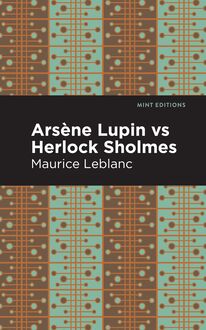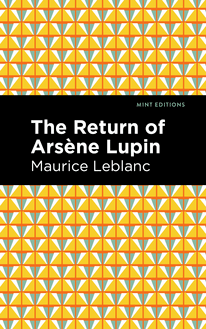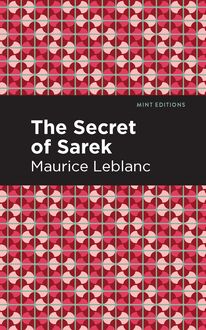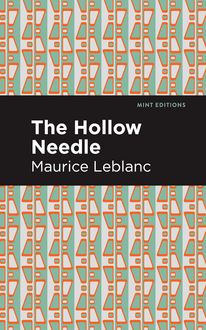-
 Univers
Univers
-
 Ebooks
Ebooks
-
 Livres audio
Livres audio
-
 Presse
Presse
-
 Podcasts
Podcasts
-
 BD
BD
-
 Documents
Documents
-
- Cours
- Révisions
- Ressources pédagogiques
- Sciences de l’éducation
- Manuels scolaires
- Langues
- Travaux de classe
- Annales de BEP
- Etudes supérieures
- Maternelle et primaire
- Fiches de lecture
- Orientation scolaire
- Méthodologie
- Corrigés de devoir
- Annales d’examens et concours
- Annales du bac
- Annales du brevet
- Rapports de stage
La lecture à portée de main
Vous pourrez modifier la taille du texte de cet ouvrage
Découvre YouScribe en t'inscrivant gratuitement
Je m'inscrisDécouvre YouScribe en t'inscrivant gratuitement
Je m'inscrisEn savoir plus
Vous pourrez modifier la taille du texte de cet ouvrage
En savoir plus

Description
The Secret Tomb (1923) is a novel by Maurice Leblanc. Although he is known for his series of stories and novels featuring Arsène Lupin, a character based on the life of French anarchist Marius Jacob and inspired by Arthur Conan Doyle’s Sherlock Holmes, Leblanc also wrote standalone tales of mystery and adventure. The Secret Tomb is an entertaining blend of fantasy and crime fiction for children and adults alike.
As the sun begins to set, Dorothy grows worried about her young comrade Saint-Quentin, a teenage boy with a passion for adventure and a knack for troublemaking. Leaving their caravan, a group of orphaned children living as circus performers, Dorothy sets out into the woods to look for the boy. Remembering the castle they had recently discovered, and recalling that Saint-Quentin had wanted to sneak inside, Dorothy makes her way to a stony outcrop surrounding the rampart, where she discovers a strange man lurking. She quickly hides and watches as he opens a passage into a hidden lair. Just then, as she sees the silhouette of Saint-Quentin climb out from a castle window, the man aims a rifle in her friend’s direction, forcing Dorothy to abandon her hiding place and save Saint-Quentin’s life. The ensuing mystery involves the lord and lady of the Château de Roborey, a family secret, and a name from the distant past.
With a beautifully designed cover and professionally typeset manuscript, this edition of Maurice Leblanc’s The Secret Tomb is a classic of French literature reimagined for modern readers.
Sujets
Informations
| Publié par | Mint Editions |
| Date de parution | 24 mars 2021 |
| Nombre de lectures | 0 |
| EAN13 | 9781513295251 |
| Langue | English |
| Poids de l'ouvrage | 1 Mo |
Informations légales : prix de location à la page 0,0500€. Cette information est donnée uniquement à titre indicatif conformément à la législation en vigueur.
Extrait
The Secret Tomb
Maurice Leblanc
The Secret Tomb was first published in 1923.
This edition published by Mint Editions 2021.
ISBN 9781513292403 | E-ISBN 9781513295251
Published by Mint Editions®
minteditionbooks.com
Publishing Director: Jennifer Newens
Design & Production: Rachel Lopez Metzger
Project Manager: Micaela Clark
Typesetting: Westchester Publishing Services
C ONTENTS I . T HE C HÂTEAU DE R OBOREY II . D OROTHY’S C IRCUS III . E XTRA- L UCID IV . T HE C ROSS- E XAMINATION V . “ W E W ILL H ELP Y OU” VI . O N THE R OAD VII . T HE H OUR D RAWS N EAR VIII . O N THE I RON W IRE IX . F ACE TO F ACE X . T OWARDS THE G OLDEN F LEECE XI . T HE W ILL OF THE M ARQUIS DE B EAUGREVAL XII . T HE E LIXIR OF R ESURRECTION XIII . L AZARUS XIV . T HE F OURTH M EDAL XV . T HE K IDNAPING OF M ONTFAUCON XVI . T HE L AST Q UARTER OF A M INUTE XVII . T HE S ECRET P ERISHES XVIII . I N R OBORE F ORTUNA
I
T HE C HÂTEAU DE R OBOREY
U nder a sky heavy with stars and faintly brighter for a low-hanging sickle moon, the gipsy caravan slept on the turf by the roadside, its shutters closed, its shafts stretched out like arms. In the shadow of the ditch nearby a stertorous horse was snoring.
Far away, above the black crest of the hills, a bright streak of sky announced the coming of the dawn. A church clock struck four. Here and there a bird awoke and began to sing. The air was soft and warm.
Abruptly, from the interior of the caravan, a woman’s voice cried:
“Saint-Quentin! Saint-Quentin!”
A head was thrust out of the little window which looked out over the box under the projecting roof.
“A nice thing this! I thought as much! The rascal has decamped in the night. The little beast! Nice discipline this is!”
Other voices joined in the grumbling. Two or three minutes passed, then the door in the back of the caravan opened and a shadowy figure descended the five steps of the ladder while two tousled heads appeared at the side window.
“Dorothy! Where are you going?”
“To look for Saint-Quentin!” replied the shadowy figure.
“But he came back with you from your walk last night; and I saw him settle down on the box.”
“You can see that he isn’t there any longer, Castor.”
“Where is he?”
“Patience! I’m going to bring him back to you by the ears.”
But two small boys in their shirts came tumbling down the steps of the caravan and implored her:
“No, no, mummy Dorothy! Don’t you go away by yourself in the night-time. It’s dangerous…”
“What are you making a fuss about, Pollux? Dangerous? It’s no business of yours!”
She smacked them and kicked them gently, and brought them quickly back to the caravan into which they climbed. There, sitting on the stool, she took their two heads, pressed them against her face, and kissed them tenderly.
“No ill feeling, children. Danger? I’ll find Saint-Quentin in half an hour from now.”
“A nice business! … Saint-Quentin! … A beggar who isn’t sixteen!”
“While Castor and Pollux are twenty—taken together!” retorted Dorothy.
“But what does he want to go traipsing about like this at night for? And it isn’t the first time either… Where is it he makes these expeditions to?”
“To snare rabbits,” she said. “There’s nothing wrong in it, you see. But come, there’s been talk enough about it. Go to by-by again, boys. And above all, Castor and Pollux, don’t fight. D’you hear? And no noise. The Captain’s asleep; and he doesn’t like to be disturbed, the Captain doesn’t.”
She took herself off, jumped over the ditch, crossed a meadow, in which her feet splashed up the water in the puddles, and gained a path which wound through a copse of young trees which only reached her shoulders. Twice already, the evening before, strolling with her comrade Saint-Quentin, she had followed this half-formed path, so that she went briskly forward without hesitating. She crossed two roads, came to a stream, the white pebbly bottom of which gleamed under the quiet water, stepped into it, and walked up it against the current, as if she wished to hide her tracks, and when the first light of day began to invest objects with clear shapes, darted forth afresh through the woods, light, graceful, not very tall, her legs bare below a very short skirt from which streamed behind her a flutter of many-colored ribbons.
She ran, with effortless ease, surefooted, with never a chance of spraining an ankle, over the dead leaves, among the flowers of early spring, lilies of the valley, violet anemones, or white narcissi.
Her black hair, not very long, was divided into two heavy masses which flapped like two wings. Her smiling face, parted lips, dilated nostrils, her half-closed eyes proclaimed all her delight in her swift course through the fresh air of the morning. Her neck, long and flexible, rose from a blouse of gray linen, closed by a kerchief of orange silk. She looked to be fifteen or sixteen years old.
The wood came to an end. A valley lay before her, sunk between two walls of rock and turning off abruptly. Dorothy stopped short. She had reached her goal.
Facing her, on a pedestal of granite, cleanly cut down, and not more than a hundred feet in diameter, rose the main building of a ch â teau, which though it lacked grandeur of style itself, yet drew from its position and the impressive nature of its construction an air of being a seigniorial residence. To the right and left the valley, narrowed to two ravines, appeared to envelop it like an old-time moat. But in front of Dorothy the full breadth of the valley formed a slightly undulating glacis, strewn with boulders and traversed by hedges of briar, which ended at the foot of the almost vertical cliff of the granite pedestal.
“A quarter to five striking,” murmured the young girl. “Saint-Quentin won’t be long.”
She crouched down behind the enormous trunk of an uprooted tree and watched with unwinking eyes the line of demarcation between the ch â teau itself and its rocky base.
A narrow shelf of rock lengthened this line, running below the windows of the ground floor; and there was a spot in this exiguous cornice at which there came to an end a slanting fissure in the face of the cliff, very narrow, something of the nature of a crevice in the face of a wall.
The evening before, during their walk, Saint-Quentin had said, his finger pointing at the fissure:
“Those people believe themselves to be perfectly secure; and yet nothing could be easier than to haul one’s self up along that crack to one of the windows… Look; there’s one which is actually half-open… the window of some pantry.”
Dorothy had no doubt whatever that the idea of climbing the granite pedestal had gripped Saint-Quentin and that that very night he had stolen away to attempt it. What had become of him after the attempt? Had there not been some one in the room he had entered? Knowing nothing of the place he was exploring nor of the dwellers in it, had he not let himself be taken? Or was he merely waiting for the break of day?
She was greatly troubled. For all that she could see no sign of a path along the ravine, some countryman might come along at the very moment at which Saint-Quentin took the risk of making his descent, a far more difficult business than climbing up.
Of a sudden she quivered. One might have said that in thinking of this mischance she had brought it on them. She heard the sound of heavy footfalls coming along the ravine and making for its main entrance. She buried herself among the roots of the tree and they hid her. A man came in sight. He was wearing a long blouse; his face was encircled and hidden by a gray muffler; old, furred gloves covered his hands; he carried a gun on his arm, a mattock over his shoulder.
She thought that he must be a sportsman, or rather a poacher, for he walked with an uneasy air, looking carefully about him, like one who feared to be seen, and who was carefully changing his usual bearing. But he came to a standstill near the wall fifty or sixty yards from the spot at which Saint-Quentin had made the ascent, and studied the ground, turning over some flat stones and bending down over them.
At last he made up his mind and seizing one of these slabs by its narrower end, he raised it and set it up on end in such a manner that it was balanced after the fashion of a cromlech. So doing he uncovered a hole which had been hollowed out in the center of the deep imprint left by the slab. Then he took his mattock and set about enlarging it, removing the earth very quietly, evidently taking great care to make no noise.
A few minutes more slipped away. Then the inevitable event which Dorothy had at once desired and feared took place. The window of the ch â teau, through which Saint-Quentin had climbed the night before, opened; and there appeared a long body clad in a long black coat, its head covered with a high hat, which, even at that distance, were plainly shiny, dirty, and patched.
Squeezed flat against the wall, Saint-Quentin lowered himself from the window and succeeded in setting his two feet on the rocky shelf. On the instant Dorothy, who was at the back of the man in the blouse, was on the point of rising and making a warning signal to her comrade. The movement was useless. The man had perceived what looked to be a black devil clinging to the face of the cliff, and dropping his mattock, he slipped into the hole.
For his part, Saint-Quentin, absorbed in his job of getting down, was paying no attention to what was going on below him, and could only have seen it by turning round, which was practically impossible. Uncoiling a rope, which he had, without doubt, picked up in the mansion, he ran it round a pillar of the balcony of the window in such a fashion that the two ends hung down the face of the cliff an equal distance. With the help of this double rope the descent presented no difficulty.
Without losing a second, Dorothy, uneasy at being no longer able to see the man in a blouse, s
-
 Univers
Univers
-
 Ebooks
Ebooks
-
 Livres audio
Livres audio
-
 Presse
Presse
-
 Podcasts
Podcasts
-
 BD
BD
-
 Documents
Documents
-
Jeunesse
-
Littérature
-
Ressources professionnelles
-
Santé et bien-être
-
Savoirs
-
Education
-
Loisirs et hobbies
-
Art, musique et cinéma
-
Actualité et débat de société
-
Jeunesse
-
Littérature
-
Ressources professionnelles
-
Santé et bien-être
-
Savoirs
-
Education
-
Loisirs et hobbies
-
Art, musique et cinéma
-
Actualité et débat de société
-
Actualités
-
Lifestyle
-
Presse jeunesse
-
Presse professionnelle
-
Pratique
-
Presse sportive
-
Presse internationale
-
Culture & Médias
-
Action et Aventures
-
Science-fiction et Fantasy
-
Société
-
Jeunesse
-
Littérature
-
Ressources professionnelles
-
Santé et bien-être
-
Savoirs
-
Education
-
Loisirs et hobbies
-
Art, musique et cinéma
-
Actualité et débat de société
- Cours
- Révisions
- Ressources pédagogiques
- Sciences de l’éducation
- Manuels scolaires
- Langues
- Travaux de classe
- Annales de BEP
- Etudes supérieures
- Maternelle et primaire
- Fiches de lecture
- Orientation scolaire
- Méthodologie
- Corrigés de devoir
- Annales d’examens et concours
- Annales du bac
- Annales du brevet
- Rapports de stage
